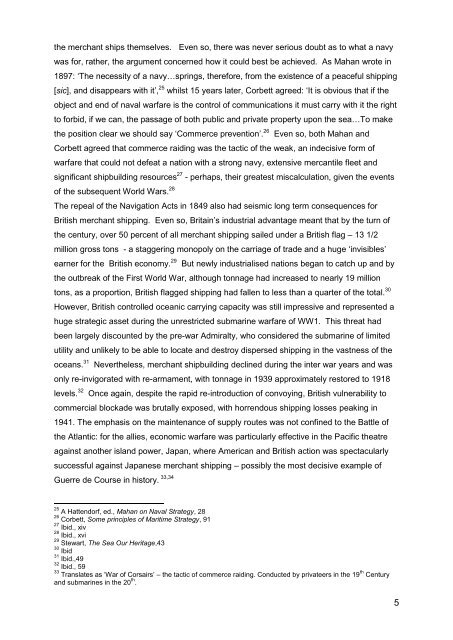90 percent by sea - Defence Academy of the United Kingdom
90 percent by sea - Defence Academy of the United Kingdom
90 percent by sea - Defence Academy of the United Kingdom
Create successful ePaper yourself
Turn your PDF publications into a flip-book with our unique Google optimized e-Paper software.
<strong>the</strong> merchant ships <strong>the</strong>mselves. Even so, <strong>the</strong>re was never serious doubt as to what a navy<br />
was for, ra<strong>the</strong>r, <strong>the</strong> argument concerned how it could best be achieved. As Mahan wrote in<br />
1897: ‘The necessity <strong>of</strong> a navy…springs, <strong>the</strong>refore, from <strong>the</strong> existence <strong>of</strong> a peaceful shipping<br />
[sic], and disappears with it’, 25 whilst 15 years later, Corbett agreed: ‘It is obvious that if <strong>the</strong><br />
object and end <strong>of</strong> naval warfare is <strong>the</strong> control <strong>of</strong> communications it must carry with it <strong>the</strong> right<br />
to forbid, if we can, <strong>the</strong> passage <strong>of</strong> both public and private property upon <strong>the</strong> <strong>sea</strong>…To make<br />
<strong>the</strong> position clear we should say ‘Commerce prevention’. 26 Even so, both Mahan and<br />
Corbett agreed that commerce raiding was <strong>the</strong> tactic <strong>of</strong> <strong>the</strong> weak, an indecisive form <strong>of</strong><br />
warfare that could not defeat a nation with a strong navy, extensive mercantile fleet and<br />
significant shipbuilding resources 27 - perhaps, <strong>the</strong>ir greatest miscalculation, given <strong>the</strong> events<br />
<strong>of</strong> <strong>the</strong> subsequent World Wars. 28<br />
The repeal <strong>of</strong> <strong>the</strong> Navigation Acts in 1849 also had seismic long term consequences for<br />
British merchant shipping. Even so, Britain’s industrial advantage meant that <strong>by</strong> <strong>the</strong> turn <strong>of</strong><br />
<strong>the</strong> century, over 50 <strong>percent</strong> <strong>of</strong> all merchant shipping sailed under a British flag – 13 1/2<br />
million gross tons - a staggering monopoly on <strong>the</strong> carriage <strong>of</strong> trade and a huge ‘invisibles’<br />
earner for <strong>the</strong> British economy. 29 But newly industrialised nations began to catch up and <strong>by</strong><br />
<strong>the</strong> outbreak <strong>of</strong> <strong>the</strong> First World War, although tonnage had increased to nearly 19 million<br />
tons, as a proportion, British flagged shipping had fallen to less than a quarter <strong>of</strong> <strong>the</strong> total. 30<br />
However, British controlled oceanic carrying capacity was still impressive and represented a<br />
huge strategic asset during <strong>the</strong> unrestricted submarine warfare <strong>of</strong> WW1. This threat had<br />
been largely discounted <strong>by</strong> <strong>the</strong> pre-war Admiralty, who considered <strong>the</strong> submarine <strong>of</strong> limited<br />
utility and unlikely to be able to locate and destroy dispersed shipping in <strong>the</strong> vastness <strong>of</strong> <strong>the</strong><br />
oceans. 31 Never<strong>the</strong>less, merchant shipbuilding declined during <strong>the</strong> inter war years and was<br />
only re-invigorated with re-armament, with tonnage in 1939 approximately restored to 1918<br />
levels. 32 Once again, despite <strong>the</strong> rapid re-introduction <strong>of</strong> convoying, British vulnerability to<br />
commercial blockade was brutally exposed, with horrendous shipping losses peaking in<br />
1941. The emphasis on <strong>the</strong> maintenance <strong>of</strong> supply routes was not confined to <strong>the</strong> Battle <strong>of</strong><br />
<strong>the</strong> Atlantic: for <strong>the</strong> allies, economic warfare was particularly effective in <strong>the</strong> Pacific <strong>the</strong>atre<br />
against ano<strong>the</strong>r island power, Japan, where American and British action was spectacularly<br />
successful against Japanese merchant shipping – possibly <strong>the</strong> most decisive example <strong>of</strong><br />
Guerre de Course in history. 33,34<br />
25 A Hattendorf, ed., Mahan on Naval Strategy, 28<br />
26 Corbett, Some principles <strong>of</strong> Maritime Strategy, 91<br />
27 Ibid., xiv<br />
28 Ibid., xvi<br />
29 Stewart, The Sea Our Heritage,43<br />
30 Ibid<br />
31 Ibid.,49<br />
32 Ibid., 59<br />
33 Translates as ‘War <strong>of</strong> Corsairs’ – <strong>the</strong> tactic <strong>of</strong> commerce raiding. Conducted <strong>by</strong> privateers in <strong>the</strong> 19 th Century<br />
and submarines in <strong>the</strong> 20 th .<br />
5

















